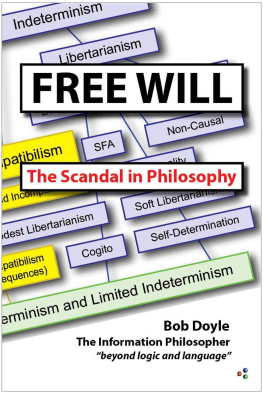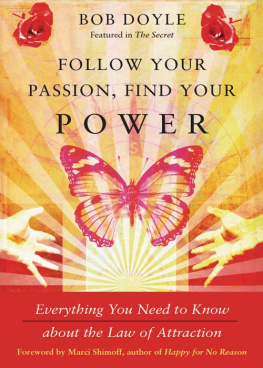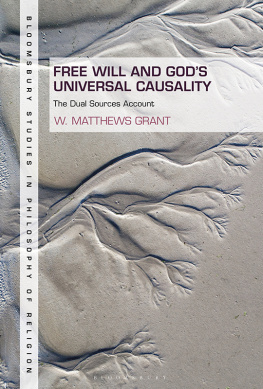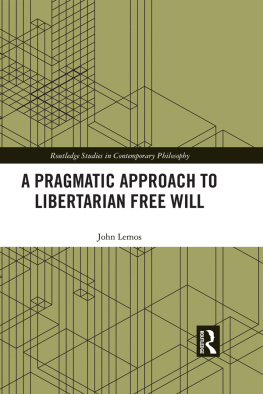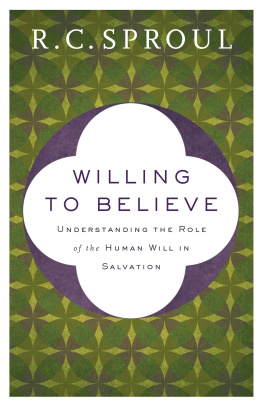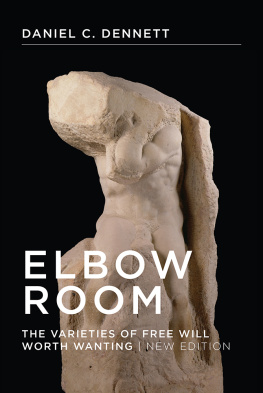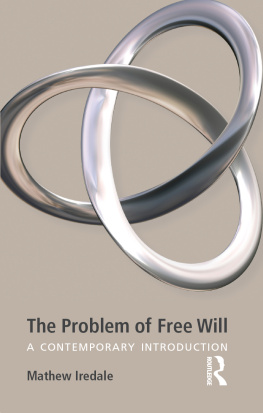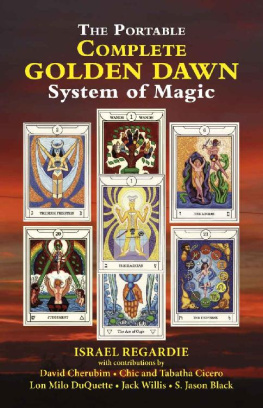About the Cover
Academic philosophers today have developed an absurd number of niches from which to defend their often exotic positions on the free will problem.
Determinism is the position that every event has a cause, in a chain of causal events with just one possible future. Soft and hard determinism are terms invented by William James. Hard determinists simply deny the existence of free will. Soft determinists claim a freedom that is compatible with determinism. This is now called Compatibilism . Semicompatibilists are narrow incompatibilists who are agnostic about free will and determinism but claim that moral responsibility is compatible with determinism. Hard incompatibilists think both free will and moral responsibility are not compatible with determinism. Illusionists are hard incompatibilists who say free will is an illusion and usually deny moral responsibility. Impossibilists are hard incompatibilists who say that both free will and moral responsibility are impossible.

Indeterminism is the position that there are random (chance) events in a world with many possible futures. Libertarians believe that indeterminism makes free will possible. Agent-causalists are libertarians who think that agents have originating causes for their actions that are not events. Non-causalists simply deny any causes whatsoever for libertarian free will. Event-causalists accept chance decisions. Soft causalists admit some unpredictable events that are causa sui which start new causal chains. Self-Determination describes decision determined by the agents character. Two-Stage Models are todays most plausible models for free will, putting limits on both determinism and indeterminism. See Chapter for more details
What Philosophers Are Saying about Free Will

How Free Are You? , asks the well-known determinist philosopher T ED H ONDERICH , in his best-selling book. Though he is its foremost champion, Honderich frankly characterizes determinism as a black thing and an incubus which gives him dismay.
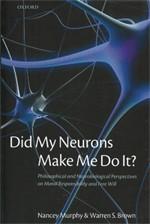
Did My Neurons Make Me Do It? , asks N ANCEY M URPHY , summarizing the concern of philosophers who think neuroscience will reveal us to be just biological machines that are running programs determined by our heredity and environment, by our genes and our upbringing,

Is Conscious Will an Illusion? Harvard psychologist D ANIEL W EGNER thinks so. We think we do things freely for good reasons, but Wegner finds we often confabulate reasons after the fact, when we are challenged to provide the motivations for our actions.

Living Without Free Will is required, according to hard incompatibilist philosopher D ERK P EREBOOM . And philosopher G ALEN S TRAWSON provides a logical and basic argument to prove that we cannot possibly be responsible for our actions, because they are the consequences of a causal chain that goes back to times long before we were born.
Why The Free Will Scandal Should Matter to You
Academic philosophers, psychologists, and neuroscientists teach their students to believe that their actions may be determined and beyond their control, that free will is an illusion.

Like the workers in Charlie Chaplins Modern Times, humans are seen as cogs in a vast biological machine. If scientists could show that this is so, and give us reasonable evidence for it, we would have little choice but to accept the science. Or, we could do as Immanuel Kant did in his great Critique of Pure Reason. We might doubt Reason to make room for Belief in Free Will.
But physical and biological science can produce no such evidence. Iron-clad proof that determinism is true is beyond the reach of empirical science, since evidence is always prone to observational errors, and physics today is indeterministic.
Nevertheless, some philosophers accept the faulty reasoning that freedom exists only on some metaphysical plane. If you accept freedom as a mystery beyond explanation, a gift of God beyond understanding by our finite minds, perhaps you need not worry and may not need this book.
But this ivory-tower thinking should still matter to you. Why? Because we have good evidence that telling young people they are determined beings, and that they are not responsible for their actions, actually makes them behave less morally, more willing to cheat their colleagues in innocent games, for example.
Whether you are one of those young students, or one of the older generation sending your children to school, or perhaps one of the faculty teaching our young, you should be concerned about what we are doing to the life hopes and moral fibre of our youth.
If you see something scandalous in this situation, this book provides you with the resources you need to do something to change what we are teaching in our schools.
La Trahison des Philosophes...
In a world full of problems, they sat doing puzzles.
Qui docet doctores?
Tantum philosophia potuit suadere malorum.
Werte ohne Freiheit sind nutzlos,
Freiheit ohne Werte ist absurd.
Ich mute also den Determinismus und den Indeterminismus aufheben,
um fr die Freiheit Platz zu bekommen.
Our thoughts are free. Our actions are willed.
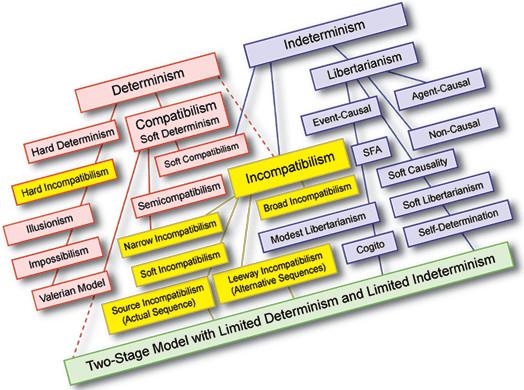
This book on the web
informationphilosopher.com/freedom
FREE WILL
The Scandal in Philosophy
The Information Philosopher
beyond logic and language
Bob Doyle

First Amazon Kindle edition, 2011
2011, Bob Doyle, The Information Philosopher
All rights reserved. No part of this book may be reproduced in any form by electronic or mechanical means (including photocopying, recording, or information storage and retrieval) without the prior permission of The Information Philosopher.
Publishers Cataloging-in-Publication data
(Prepared by Backstage Library Works)
Doyle, Bob. 1936
Original Source: Free will : the scandal in philosophy / Bob Doyle. Cambridge, Mass. : I-Phi Press, 2011.
p. ; cm. Includes bibliographic references and index.
First Edition June 2011 (ISBN13: 978-0-9835802-0-1)
1. Philosophy. 2. Free will and determinism. 3. Information
science--Philosophy. I. Title.
BJ1461.D69 2011
123.5dc22
eBook Process: Export from InDesign Digital Source File to EPUB format
Edited with Sigil
EPUB to Mobi with Calibre
Conversion Services by: I-Phi Press
Amazon Kindle edition ISBN 978-0-9835802-1-8
I-Phi Press
Cambridge, MA, USA

Dedication
To seven philosophers who made a difference to freedom two ancient Greeks, the greatest Scot, the greatest German, the two greatest Americans, and the greatest Austrian
Next page
